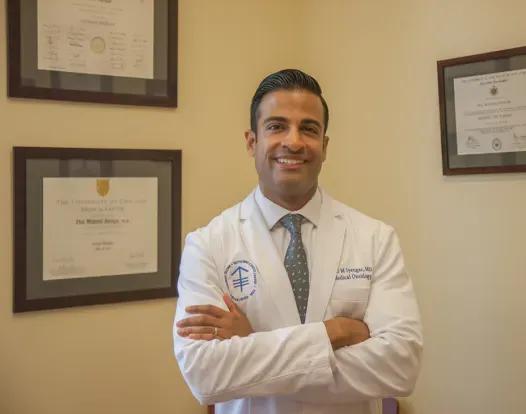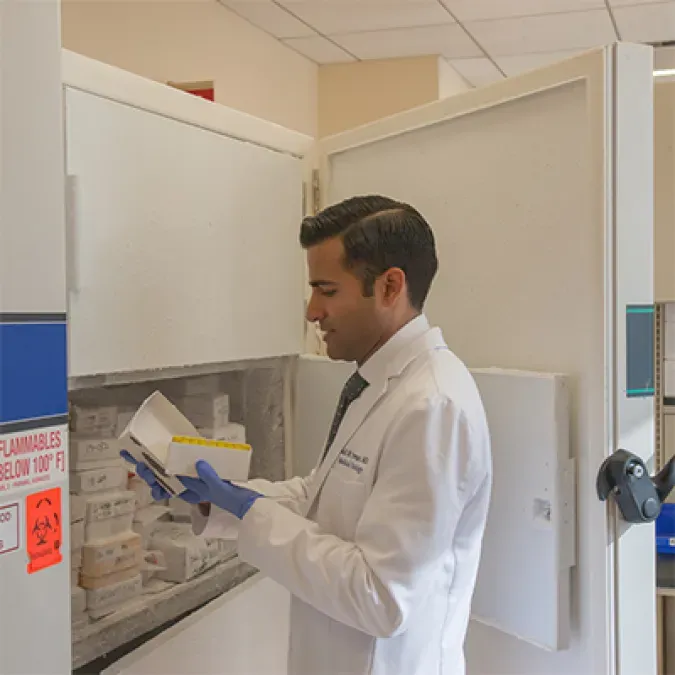These researchers dedicate their careers to finding new treatments and cures for people with cancer.


New Insights About Metabolic Health May Help Prevent Breast Cancer
Traditionally, studies about the link between obesity and breast cancer have focused on measurements of size, like body mass index (BMI) or waist circumference. Dr. Iyengar and his team identified a different measurement by looking specifically at the adipose (fatty) tissue in the breast.
They identified a process called white adipose tissue inflammation, which Dr. Iyengar explains is “inflammation in the fatty tissue in the breast that leads to increased estrogen signaling in the breast.” This inflamed fatty tissue was present in 90% of the obese patients with breast cancer in Dr. Iyengar’s study and 30% of non-obese patients.
His work is building on research that found not all waistlines are created equal, and not all obesity is the same when it comes to breast cancer prevention and treatment. Dr. Iyengar is laying the groundwork for more large-scale clinical trials to further explore the relationship between tissue inflammation and breast cancer.
The research findings of Dr. Iyengar and his team also contributed to the launch of the new MSK Healthy Living program. Participants are provided with a comprehensive questionnaire that asks about their lifestyle patterns. This self-assessment reflects the latest research on improving treatment outcomes and quality of life for patients. The program connects patients with one-on-one support related to nutrition, exercise, sleep, fertility concerns, mental health, body image and more.
Q&A with Dr. Iyengar: Finding a Breakthrough in Metabolic Health
In the following Q&A, Dr. Iyengar explains the impact of his key research findings and how donor-supported research has fueled discoveries that are helping patients prevent and conquer cancer.
Why is research linking diet, exercise, and cancer so important?
Obesity is a leading modifiable cause of at least 13 different cancers and will soon become the number one preventable cause. My research program aims to understand how metabolic health impacts cancer risk and treatments. We are specifically researching how body fat, either in obese individuals or even in normal weight individuals, influences cancer growth and treatment resistance. This is important because at least 1 in 6 male cancer deaths and 1 in 7 female cancer deaths are related to obesity.
How is your research improving treatment and outcomes for patients?
We recently published a study that was supported by Conquer Cancer which included nearly 4,000 women. In this study, we found that high body fat levels in non-obese women with a normal weight, who are considered to be healthy, doubled the risk of developing breast cancer. We are now developing personalized exercise, diet, and medical interventions to combat the negative impact of both obesity and body fat on cancer growth and recurrence.
What is the goal of your National Cancer Institute-supported clinical trial?
The goal of the upcoming NCI-supported exercise trial is to identify the best “dose” of exercise for people with metastatic breast cancer. Ultimately, the goal of my research program is to develop precision metabolic interventions to prevent and treat cancer. This may include individualized exercise prescriptions, tailored diets, or even medications that are typically used to treat diabetes or other metabolic disorders. By developing an optimal wellness program, my goal is to create a comprehensive but individualized approach to preventing cancer and cancer recurrence. We have much to learn about how we can harness the power of metabolically-targeted interventions like diet and exercise to provide personalized recommendations and prevent cancer or cancer recurrence.
How have Conquer Cancer donors impacted your work?
Without the two Conquer Cancer grants I received, I may not have had the opportunity to generate the data that led to the research trials that I am now conducting. We have at least 4 different active trials at this moment, and the Conquer Cancer grants were pivotal to launching this program and giving me the credibility to collaborate with well-established scientists at my own institution and across the world.

